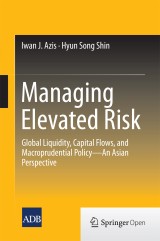Details

Managing Elevated Risk
Global Liquidity, Capital Flows, and Macroprudential Policy-An Asian Perspective|
51,16 € |
|
| Verlag: | Springer |
| Format: | |
| Veröffentl.: | 11.12.2014 |
| ISBN/EAN: | 9789812872845 |
| Sprache: | englisch |
Dieses eBook enthält ein Wasserzeichen.
Beschreibungen
<p>This book discusses the risks and opportunities that arise in Emerging Asia given the context of a new environment in global liquidity and capital flows. It elaborates on the need to ensure financial and overall economic stability in the region through improved financial regulation and other policy measures to minimize the emergent risks. "<i>Managing Elevated Risk: Global Liquidity, Capital Flows, and Macroprudential Policy—An Asian Perspective</i>" also explores the range of policy options that may be deployed to address the impact of global liquidity on domestic financial and socio-economic conditions including income inequality. The book is primarily aimed at policy makers, financial market regulators and supervisory agencies to help them improve national regulatory systems and to promote harmonization of national regulations and practices in line with global standards. Scholars and researchers will also gain important information and knowledge about the overall impacts of changing global liquidity from the book.</p>
<p>Contents.- Foreword.- Chapter 1: Introduction and Overview.- Chapter 2: The Three Phases of Global Liquidity.- 2.1: Conceptual and Measurement Issues.- 2.2: First Phase of Global Liquidity.- 2.2.1: Round-trip Bank Flows to the US.- 2.2.2: Banking Sector Flows to the Rest of the World.- 2.2.3: Exchange Rates and Leverage.- 2.3: Second Phase of Global Liquidity.- 2.4: The Case of Emerging Asia.- 2.5: Third Phase and Onward.- 2.6: References.- Chapter 3: Early Warning Indicators for Financial Vulnerabilities.- 3.1: Principles for Selection of Early Warning Indicators.- 3.2: Core and Noncore Liabilities.- 3.3: References.- Chapter 4: Emerging Asia’s Noncore Liabilities and Policy Effectiveness.- 4.1: Bank-led Flows, Noncore Liabilities, and Credit Growth.- 4.2: Reassessing Monetary Policy.- 4.3: Appendix.- 4.4: References.- Chapter 5: Capital Flows and Income Distribution.- 5.1: National Policy Remains Key.- 5.2: How Capital Flows Affect Income Inequality.- 5.3: Prioritization for a Multi-Objective Goal.- 5.4: Appendix.- 5.5: References.- Chapter 6: Policy Implications.- 6.1 Tailoring Policies to Vulnerabilities.- 6.2 Macroprudential Tools.- 6.2.1 Bank Capital-Oriented Tools.- 6.2.1.1 Capital Requirements that Adjust Over the Cycle.- 6.2.1.2 Forward-Looking Provisioning.- 6.2.1.3: Leverage caps.- 6.2.1.4: Loan-To-Value and Debt-Service-To-Income Caps.- 6.2.1.5: Loan-to-Deposit caps.- 6.2.1.6: Levy on Noncore Liabilities.- 6.2.1.7: Unremunerated Reserve Requirements.- 6.2.2: Relative Merits of URR versus Levies/Taxes.- 6.2.3: Relationship with other Stabilization Policies.- 6.3: Financial Integration and Institutional Design.- 6.4: Policy Choices.- 6.5: References.-</p><p>
<p>Iwan Azis has been teaching at Cornell University since 1992. He was also Director of Graduate Study at the Regional Science Program and adjunct professor at the Johnson Graduate School of Management before he took a leave to head the Asian Development Bank’s Office of Regional Economic Integration (OREI). His main research interest is on macro-financial economics and regional economic modeling. He obtained his Bachelor in economics from the University of Indonesia (1976); Ph.D (1982) and Master’s degree (1981) in Regional Science and Economics from Cornell University.</p><p>Hyun Song Shin took up the position of Economic Adviser and Head of Research at the BIS on 1 May 2014. Before joining the BIS, Mr. Shin was the Hughes-Rogers Professor of Economics at Princeton University. In 2010, on leave from Princeton, he served as Senior Adviser to the Korean president, taking a leading role in formulating financial stability policy in Korea and developing the agenda for the G20 during Korea's presidency. From 2000 to 2005, he was Professor of Finance at the London School of Economics. He holds a DPhil and MPhil in Economics from Oxford University (Nuffield College) and a BA in Philosophy, Politics and Economics from the same university.</p>
<p>This book discusses the risks and opportunities that arise in Emerging Asia given the context of a new environment in global liquidity and capital flows. It elaborates on the need to ensure financial and overall economic stability in the region through improved financial regulation and other policy measures to minimize the emergent risks. "<i>Managing Elevated Risk: Global Liquidity, Capital Flows, and Macroprudential Policy—An Asian Perspective</i>" also explores the range of policy options that may be deployed to address the impact of global liquidity on domestic financial and socio-economic conditions including income inequality. The book is primarily aimed at policy makers, financial market regulators and supervisory agencies to help them improve national regulatory systems and to promote harmonization of national regulations and practices in line with global standards. Scholars and researchers will also gain important information and knowledge about the overall impacts of changing global liquidity from the book.</p>
<p>Provides timely and relevant insights into current financial developments in Asia</p><p>Explores the range of policy options that may be deployed to address the impact of global liquidity on domestic financial conditions and income inequality</p><p>Essential reading for both academics and practitioners alike</p><p>Includes supplementary material: sn.pub/extras</p>
Diese Produkte könnten Sie auch interessieren:

Mindfulness and Self-Leadership. Investigating the Impact of Daily Meditation Practices

von: Cindy Krzykowski

36,99 €

IFRS 18. Auswirkungen auf das Rechnungswesen und die Wirtschaftsprüfung

von: Sepehr Nassrollahzadeh

39,99 €














